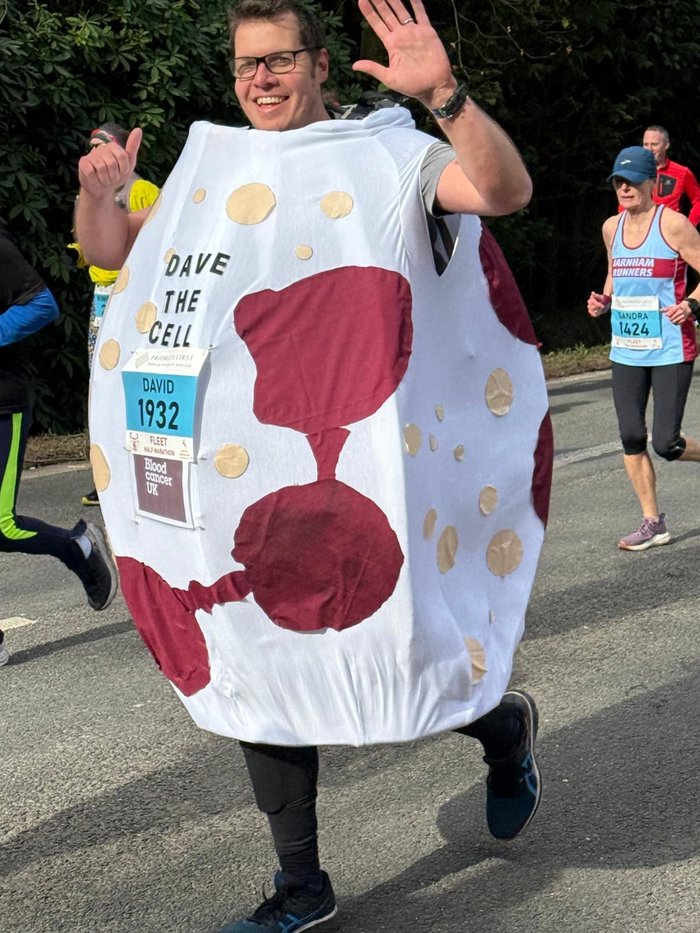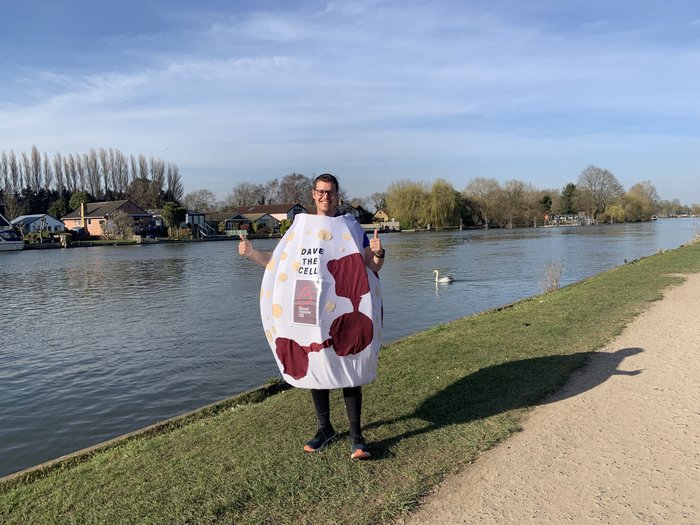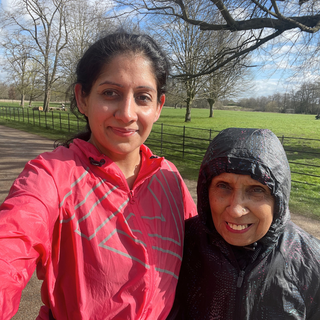I’m running the London Marathon as a white blood cell in a Guinness World Record attempt
South East
On April 27, David Hartley will take on the 2025 TCS London Marathon dressed as a white blood cell. Not only is he running to raise funds for Blood Cancer UK, but he is also aiming to set a Guinness World Record in the process.

David Hartley in costume!
David, 38, from Walton-on-Thames, has a deeply personal reason for supporting Blood Cancer In 2017, his father was diagnosed with polycythaemia vera (PV), a type of blood cancer.
Blood Cancer UK became an invaluable source of information throughout my dad’s treatment
- David Hartley, whose running the London Marathon
Six months later, the family was dealt another blow when he was also diagnosed with multiple myeloma.
“It was an incredibly difficult time for our family,” David recalls. “Blood Cancer UK became an invaluable source of information throughout my dad’s treatment.”
Although David was once an avid ultra-marathon runner, a spinal fracture in 2017 forced him to stop running. But after years of rehabilitation, and his fathers’ health battles, he decided to return to the sport.
“I wanted to do something different to raise awareness of blood cancer. Through my work in vaccine and medicine research, I thought, why not run as a biological cell? I proposed it to Guinness World Records, and they accepted it. So I’m running as a neutrophil- a white blood cell.”

Dave the cell!
The challenge, however, is far from easy. Guinness World Records has set a time requirement of four hours—an ambitious goal even without the costume.
“The fastest I’ve ever run a marathon was 4 hours 17 minutes,” David explains. “So, attempting this in costume is going to be tough. But you never know what will happen on the day!”
David has spent months designing and building the costume himself ensuring that it meets Guinness’ strict requirements while remaining light enough to run in.
“I’m not a particularly creative person, so I was pleased when it actually started to look like a white blood cell!” he laughs. “I used hula hoops, poles, string, and fabric—I even had to teach myself some sewing skills.”
If running in this costume makes people stop and ask questions, then it’s worth it.”
- David Hartley, from Walton-on-Thames
Blood cancer is the UK’s fifth most common cancer, yet public awareness remains low.
“People often think of leukaemia, but they don’t realise that blood cancer is a group of over 100 different conditions including myeloma or PV” David says. “If running in this costume makes people stop and ask questions, then it’s worth it.”
We can’t wait to be cheering him on at the Blood Cancer UK cheer points on the London streets.”
- Natalie MacDougall, Blood Cancer UK
Natalie MacDougall, sporting events coordinator for Blood Cancer UK, said:
“David’s not only pushing himself physically, but he’s also helping us raise vital awareness and funds for blood cancer research. Blood cancer is the UK’s third largest cancer killer and every step he takes in the marathon brings us closer to better treatments and support for those affected by myeloma and other blood cancers. We can’t wait to be cheering him on at the Blood Cancer UK cheer points on the London streets.”
This isn’t David’s first time running the London Marathon in costume.
“In 2011, I dressed as a dog and ran on a lead to guide my blind friend,” he recalls. “And in 2017, I had the incredible experience of receiving my medal from Prince William at the finish line. You never know what surprises the marathon will bring!”

David dressed as a dog!
With his family and friends cheering him on, David hopes to complete the marathon in record time while raising as much as possible for Blood Cancer UK.
“At the end of the day, this is about making a difference for my dad. Every pound raised helps fund research and can support for families like mine.”
After years of intensive treatment, including chemotherapy and a stem cell transplant, David’s dad has now reached full remission.
“We know how fortunate we are,” David says. “It’s been a long and difficult journey, but to hear the words ‘undetectable levels’ was incredible. We also know that blood cancer can relapse, so research is crucial to finding better, longer-lasting treatments.”


